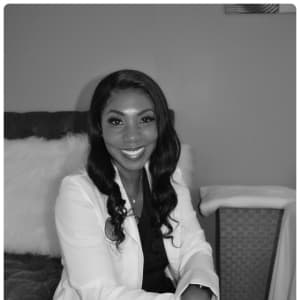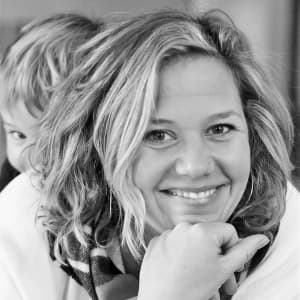COVID-19 and How It’s Changed Nursing: A Two Year Reflection
 Credit: Mireya Acierto / Getty Images
Credit: Mireya Acierto / Getty ImagesThroughout the COVID-19 pandemic, Megan Champion, FNP, cares for patients as a family nurse practitioner in a community health clinic and at the bedside as an intensive care unit (ICU) nurse. She sees how the pandemic has imposed disparity and devastation in underserved communities in the clinic. In the ICU, she grapples with death and disease head-on, the strain amplified by staffing shortages and burnout.
Looking back at the last two years, any nurse may ask: How could we have prepared for this?
Even with 10 years of ICU nursing experience, “nothing could have prepared me, or anyone, for a global pandemic,” Champion says.
She shares the lessons she’s learned during this time — and the reality of what it means to be part of this first generation of nurses who have worked through the unprecedented times of a global pandemic.
Along with Champion, we spoke with a seasoned charge nurse nearing the end of her career and a new nursing school graduate who’s known nothing but working in a pandemic.
These are their stories.
An Inside Look: Nursing During Unprecedented Times
At this point in the pandemic, it seems like the public has a general understanding of what nurses do. Whether it’s from personal connections or the media, the sacrifices of nurses have not gone unnoticed.
Eve Hinds, RN, MBA, is a charge nurse with 20 years of experience in inpatient and outpatient settings, including critical care and surgical nursing. She says the praise she receives in the community makes her feel appreciated and respected.
“Back in 2003 or 2004, no one really cared if I was a nurse. It was just a job. I was just a nurse,” she says. “But after the pandemic, you state your profession, and a lot of eyes open wide.”
While images in the media depict hospital staff in gowns and masks caring for patients in emergency scenarios, Champion shares a less dramatic but equally painful side of the COVID-19 pandemic.
In the community health clinic, her patients suffer the disproportionate impacts of the disease on all aspects of their well-being. Once the lockdown started, Champion’s working-class patients did not have the option to stay home from work, and many became sick with COVID-19 or worse.
“Our patients truly suffered not just the loss of life,” she says, “but also loss of housing, loss of financial security, food insecurity, domestic violence, increased substance use, and all the ripple effects this pandemic has put in motion.”
Beyond sickness, Champion also witnessed families suffering the loss of a parent and financial breadwinners when former President Donald Trump’s Zero Tolerance program removed parents and guardians from their homes.
With the increased presence of Immigration and Customs Enforcement, at-risk communities were torn apart from political impositions on top of disease and financial loss.
“Add heartbreak, desperation, and loss of financial stability to a pandemic, and you can see it has been a nightmare for our patients,” Champion says.
How the Pandemic Has Shaped What It Means to Be a Nurse
Every nurse has been impacted differently by the pandemic, and their views on healthcare will forever be changed.
After graduating nursing school, Maggie Ortiz began her first nursing role on a medical-surgical nephrology floor in February 2020. For Ortiz, a passion for nursing keeps her showing up for her patients, and it has even earned her the prestigious DAISY Award.
Oritz’s perspective on healthcare has not changed much because working in a pandemic is her baseline. She can’t recall a time before COVID-19 flowsheets were integrated into Epic, their healthcare management system — this is all she knows.
But many nurses can’t help but notice the effects of politics getting involved in healthcare. Champion mentions feeling shocked by how heavily politics have influenced the science of healthcare.
“It is unnerving to see the effects different presidential administrations have had on something that should be based on science and fact,” she says.
Additionally for Champion, her role as a patient advocate is more important than ever. She’s gone beyond providing just bedside care to her patients. Through the call center at her clinic, she provides not just medical advice but screening and support for depression, anxiety, domestic violence, and food security.
“We were able to connect folks with resources to help with childcare, housing, and hunger,” Champion says.
Limitations, Appreciation, and a Call to Action
As nurses’ perceptions of healthcare have changed in the last two years, so have their expectations for themselves.
Ortiz says working during the pandemic shaped her expectations in how she relates to others. She says that as a nurse, it’s her duty to protect others in the hospital and the community, whether that means getting vaccinated or staying home when she is feeling sick.
Hinds says her commitment to nursing is as simple as showing up for work. She’s grateful to hear kind words or recognition like “thank you for your service” and “we appreciate your commitment.”
Hinds is just as needed today as she was at the beginning of the pandemic. As more nurses leave the bedside in 2022, nursing shortages are a major concern for the future of healthcare.
Champion says in the ICU, staffing shortages have put nurses in positions where they cannot give the quality care they want to provide.
“Patients waiting to be cleaned up, call lights going unanswered — these are all routine now where they never were before,” Champion says. “All our energy goes toward putting out emergencies and making sure people don’t die.”
Poor staffing ratios have been a major pain point for hospitals across the nation, putting nurses and patients in compromised and unsafe situations. Many nurses have grown frustrated that the care they want to provide doesn’t match the conditions they are placed in.
Champion says the ICU environment is distressing to the patients and families, but it also affects nurses.
“I know that in my unit, we are all distressed at having to compromise our care,” she says.
Nurses Are More Than ‘Healthcare Heroes’
While public support for nurses during the pandemic is encouraging, using language like “healthcare heroes” can have heavy implications. The saying indicates that nurses can stretch themselves beyond human capacity, a notion that is being tested in the current healthcare climate.
With increasing staffing shortages, nurses are expected to care for more patients than the typical workload. A strenuous patient assignment is about more than numbers; most of these patients are high acuity, needing intense nursing care and close monitoring. When a patient dies, nurses are expected to take another patient right away, having no time to process death.
“There is a stigma that nurses and healthcare providers are heroes, underdogs, and great sympathizers with endless sources of compassion,” Champion says. “We are not heroes; we are human. We are not robots; we are tired. We are capable of being frustrated, angry, and outraged.”
In addition to strenuous workloads, nurses carry the brunt of patients’ frustrations, and in turn nursing workplace violence has increased.
“Many people have shown huge amounts of gratitude for healthcare workers during this time,” Champion says. “However, just as many have shown disregard and tremendous disrespect to healthcare workers through their actions and choices. It hurts every time.”
Ortiz wishes more people recognized the importance of prioritizing nurses’ well-being to care for others. More and more nurses are getting sick and burned out because they are not allowed the resources to take care of their own health, Oritz says.
It can be difficult for nurses to take days off when their unit is already short-staffed, but mounting pressure can lead to increased nurse burnout. Ortiz wants the public to know: “Nurses need to protect themselves so they can protect you.”
How to Prepare Incoming Nurses and Nursing Students
Nursing students and new graduates are preparing to enter the workforce; navigating the pandemic is an inevitable challenge. Many nursing schools have adopted virtual learning in the nursing classroom and clinical settings, but some nurses worry nursing students are missing valuable patient experiences.
As nursing schools adapt to the pandemic’s new normal, Ortiz says educators should prioritize in-person clinical learning. Nursing students should be taught:
- How to don and doff personal protective equipment
- What new medications are out there now
- The signs and symptoms of COVID-19
She notes that policies and protocols in hospitals are constantly changing, and experiencing these changes firsthand is a way for nursing students to learn.
Not only has healthcare changed in the past two years regarding the diseases and conditions nurses are treating, but there’s been a change in the way nurses care for patients.
“There is more to this job than simply medicine,” Hinds reminds nursing students.”We have to be able to care for our patients’ and their families’ emotional needs as well.”
Remembering Why We Are Nurses
There is no denying that nursing has changed in the last two years and that healthcare will face many challenges in the years to come. However, one thing will always remain the same: Nursing is a profession founded on passion, care, and love for the human experience.
As we work together through this new normal, nurses need to support each other by:
- Making nurses’ mental health a priority
- Getting educated
- Getting vaccinated
- Understanding that this pandemic affects everyone differently
Despite the challenges of the pandemic, the three nurses share stories that remind us why this profession is so special. As a charge nurse, Hinds says her role is to educate and support patients and their family members, which is especially challenging with visitor restrictions.
“I’d have patients in the hospital dying and their family members were not allowed to be in the room with them,” Hinds says. “I did, and still do, the best I can to love on the patients, support them, and help them to go home.”
Reflecting on her experiences in the community health clinic, Champion feels touched as many patients return wearing masks or t-shirts dedicated to their family members who died of COVID-19.
“This was terribly poignant,” she says. “Seeing families with the names and images of their loved ones brandished on their faces and chests was a humble and powerful reminder that this pandemic is real, and the loss is personal.”
With Oritz’s entire nursing experience defined by the pandemic, she finds comfort in the ways she’s able to connect with her patients. In one specific instance, she recalls a patient she took care of whose family couldn’t visit, so she updated them by phone each day.
She was touched when the family called months later to let her know their mother passed. They took the time to thank Ortiz for making their mom comfortable at a time they couldn’t be there with her.
“It makes me happy to know I made an impact on this patient and their family because in my eyes, I was just doing what I was called to do, and that is nursing,” Oritz says.
Meet Our Contributors

Eve Hinds is a charge nurse well versed in providing care for patients in an outpatient or inpatient setting. She has a strong healthcare service knowledge with a master of business administration focused in healthcare. Hinds is skilled in critical care, performance improvement, and project management.

Megan Champion is a certified family nurse practitioner. She has been working at the Community Health Clinic at Sheridan Health Services since 2018. Champion graduated from the University of Connecticut School of Nursing with a bachelor of science in nursing and minor in Spanish. Champion then graduated from the University of Colorado (CU) Denver College of Nursing in 2015 with a master of science in the family nurse practitioner program. In addition to being a primary care provider, Champion is the clinical director of primary care and pediatrics at CU Sheridan Health Services.

Maggie Ortiz is a nurse, wife, and dog mom. She lives in Northwest Indiana and has a love for travel, especially anywhere there is a palm tree and an ocean view. Although she has been a nurse for a short time, she feels like this is what she is meant to do. In just under a year she received the prestigious DAISY award for her patient care and wears that honor proudly with her DAISY pin. She now works in the operating room as a circulating nurse where she can continue her passion and nursing journey.